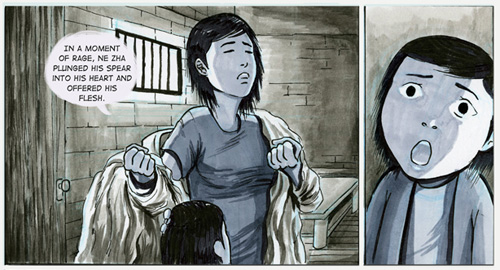Duke’s new sexual misconduct policy includes this example:
Angela and Aaron have been in an ongoing relationship for a year-and-a-half and have engaged in consensual sexual intercourse. One night while becoming intimate, Angela stops and says she doesn’t feel like having sex that night. Aaron continues to touch her, saying that she got him excited and it wasn’t fair of her to lead him on like that. Again Angela tells him she does not want to have sex, and then is silent. Aaron decides she has given in, and proceeds to have sexual intercourse with her.
This is a violation of the Sexual Misconduct Policy. Aaron had sexual intercourse with Angela against her will. The fact that Angela has freely consented to sexual intercourse with Aaron in the past does NOT mean he has her consent in this situation.
In the Boston Globe, Cathy Young criticizes the fictional Angela and exonerates the fictional Aaron:
Meanwhile, women, the default victims in the Duke policy, are presumed passive and weak-minded: Goddess forbid they should take more than minimal responsibility for refusing unwanted sex. In one of the policy’s hypothetical scenarios, a woman tells her long-term boyfriend she’s not in the mood, but then “is silent’’ in response to his continued non-forcible advances; if he takes this as consent and they have sex, that is “sexual misconduct.’’ Why she doesn’t tell him to stop remains a mystery.
The man’s behavior may be inconsiderate. However, adult college students have no more of a right to be protected from such ordinary pressures in relationships than, say, from being cajoled into buying expensive gifts for their significant other.
But although Cathy’s Globe readers wouldn’t know it from her description, fictional Angela said no (or the equivalent) twice, and Aaron had sex with her anyway. But Cathy puts all the blame on Angela (“goddess forbid (( Regarding Cathy’s sarcastic “goddess forbid”: There was a time when trendy campus feminists referred to “the goddess” in a non-ironic fashion; that time was the 1970s, and it was fading by the 1980s. It always impresses me how much professional critics of feminism are behind the times. )) [she] should take more than minimal responsibility”), and is not willing to say anything critical about Aaron’s behavior except that it “may be inconsiderate.” (( I can’t help but wonder, what would Aaron have to do before Cathy would say his behavior was certainly inconsiderate? ))
No, Cathy, having sex with someone who doesn’t want to — and who has explicitly said so, twice — isn’t merely “inconsiderate.” It’s scummy at best, and rape at worst. (( Refusing to hold Aaron accountable for his actions is sexist not only against women, but also against men. Men can be expected to take “no” as an answer, and anyone who thinks otherwise thinks too little of men. ))
A good sexual misconduct policy should provide incentives for people to listen to partners who say “no” — but judging from what Cathy writes in the Globe, Cathy would prefer a policy that says people in relationships get a free pass to ignore the first couple of refusals.
Let me be absolutely clear about this: I don’t believe Cathy wants people to be raped. But the reasoning she uses makes rape more likely to excused. And the more rapes are excused, the more rapists feel free to rape.
There’s a sexual script in our culture which says that women in certain contexts (a date, a frat party, a short skirt, an already existing relationship) have consented to have sex until the woman forcibly says “no” several times (preferably combined with a physical struggle and maybe a slap on the face). According to this sexual script, the default is that women have consented to have sex. It is only when women “take more than minimal responsibility” — which apparently, in Cathy’s view, means more than two refusals — that women can be said to have not consented to sex.
This sexual script is a recipe for disaster and rape. This sexual script teaches ordinary boys and men that they should “push” sexual encounters “as far as they can go,” ((I’m paraphrasing the way some boys talked about sex when I was a teen.)) ignoring at least the first couple of “no”s unless the “no” is said with tremendous force.
But in the real world, people don’t always say “no!” with tremendous force. Some will feel frightened or intimidated; some will freeze up or feel that further objections are pointless after the first couple of refusals are ignored. And under the all-too-common sexual script, too many girls and women are raped by boys or men who have been taught that they can assume consent — or, at least, that they have plausible deniability — until they hear the word “no” said very forcefully.
That sexual script is what most feminists (but not, it seems, Cathy) are trying to change. And feminists have changed it, to an extent. But not enough.
And for that reason, feminists should applaud much of Duke’s sexual misconduct policy. Rather than assuming consent until proven otherwise, Duke’s policy says “Consent is an affirmative decision to engage in mutually acceptable sexual activity given by clear actions or words… consent may not be inferred from silence, passivity, or lack of active resistance alone.”
Put anther way, our society should stop teaching that consent is the default state, until a sufficiently forceful “no” is stated. Boys — and girls — should be taught that non-consent is the default, unless a person enthusiastically says “yes” with words or action. Duke is trying to teach that, and they should be praised for that.
* * *
Cathy writes:
If a woman has a sexual encounter she regrets and tells a friend who decides she was coerced, the friend’s third-party report can trigger an investigation. And if she tells a dorm adviser or a women’s center staffer, they are obligated to report the incident.
Actually, according to an article in the Duke student newspaper, “Under the policy, students may still confidentially report sexual misconduct to counselors in the Women’s Center.” So I think Cathy may have gotten that wrong.
But what about dorm advisers? Cathy seems to find it obvious that all reports to dorm advisers should remain confidential, but I’m not so sure. Studies suggest that most boys and men never commit rape — but within the minority of men who rape, many commit rape multiple times.
Which is more important — protecting the confidentiality of the report, or starting a process which might make everyone safer, by punishing the rapist? I can see arguments either way (perhaps if reports aren’t confidential, students will respond by refusing to talk to dorm advisers at all). But I certainly don’t think this is as clear-cut as Cathy believes.
* * *
Incidentally, it’s not fair of Cathy to say that women are “the default victims” in Duke’s policy. Duke’s policy is written in carefully gender-neutral language, and their examples include men and women both as victims and as perpetrators.
On her blog, Cathy responds to this point:
First of all, while the text of the policy is officially gender-neutral, the policy requires the campus Women’s Center (along with the Office of Student Conduct) to be notified of all allegations of sexual misconduct. (See this August 28, 2009 article in the Chronicle, the Duke daily newspaper.) The involvement of the Women’s Center clearly suggests that the victims are generally presumed to be female.
But the article says that “the Women’s Center will reach out to the victim with medical and psychological support.” Nothing in the article suggests that the Women’s Center refuses medical and psychological support to male victims, or that they’re assuming there will never be any male victims.
That said, it would be a good idea for the Women’s Center to create a sub-organization with a gender-neutral name to handle outreach to victims, since some male victims may feel put off by being contacted by the campus Women’s Center. (( Why does it have to be the Women’s Center doing it at all, you might ask? My guess is, the Women’s Center was the only group that volunteered to do the work. ))
Incidentally, college students who are victims of sexual assault are “generally” female, and the people assaulting are “generally” male. Acknowledging that reality isn’t inherently sexist, as long as the policy itself is gender-neutral.
Secondly, is there anyone who really thinks that a man claiming to be a victim of sexual assault because he had sex with a woman while he was tipsy, or because the woman continued to come on to him after he told her he didn’t want to have sex, will be given serious consideration by a sexual misconduct review panel?
This is an example of how critics like Cathy bend over backwards to find anti-male attitudes in any feminist document, without regard for what the document actually says.
1) Cathy’s original claim — that “women [are] the default victims in the Duke policy” — is not logically supported by her new claim, which is that the panels will be too sexist to implement a gender-neutral policy fairly. (( ETA: To be clear, I agree with Cathy that the possibility of a sexist panel is a serious concern. I just disagree that it’s in any way a defense of her claim that “women [are] the default victims in the Duke policy.” ))
2) If anything, male victims have a higher chance of being taken seriously if law and policy is written in gender-neutral language and explicitly includes examples of men as victims. (( I’d argue that gender-neutral policies such as Duke’s are necessary but not sufficient conditions for fair treatment of male victims. ))
3) For the record, I would take a man’s claim of being raped or abused seriously if I were on such a panel, and I’m not unique. Although I’m sure that some people would be sexist, Cathy assumes too much when she suggests that no one on such a panel would ever respond in good faith to a man’s complaint.
* * *
My previous two posts regarding Duke’s new sexual misconduct policy can be found here and here.
![]()









@Avvaa: I'm not sure even WASP male immigrants are welcome. There have been several tourists who have been detained because…